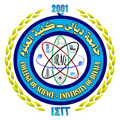
University of Diyala-College of Science organize a West Asia Mathematical School (WAMS: http://www.rnta.eu/WAMS/) school in cooperation with Nesin Mathematics Village-Izmir-Turkey, Laboratoire de Mathéatiques-Jean Leray-Universit de Nantes-France and CIMPA
“Mathematics and their interactions”
Nesin Mathematics Village-Izmir-Turkey
October 27-November 3, 2019
Coordinators
- Abdeljalil Nachaoui, Laboratoire de Mathéatiques-Jean Leray, Universit de Nantes, France
- Fatima M. Aboud, Department of mathematics, College of Sciences, University of Diyala Fatima.Aboud@sciences.uodiyala.edu.iq
Sponsord by: Diyala University, Nesin Mathematics Village, Laboratoire de Mathéatiques-Jean Leray-Universit de Nantes, CIMPA, IMU, University of Tikrit and French-Embassy-Bagdad.

Scientific Committee
- Abdeljalil Nachaoui, Laboratoire de Mathématiques Jean Leray, Université de Nantes, France
- Yusif S. Gasimov, Azerbaijan University, Azerbaijan
- Abdelhalim Larhlimi, Département Informatique, Université de Nantes, France
- Tahseen H. Moubarak, College of Sciences, University of Diyala, Iraq
- Tamaz Tadumdaze, Institute of Applied Mathematics, Tbilisi State University, Tbilisi,Georgia
- Francois Jauberteau, Laboratoire de Mathématiques Jean Leray, Université de Nantes, France
Local Organizing Committee
- The person in charge: M. Aboud, Department of mathematics, College of Sciences, University of Diyala, Iraq
- Karzan A. Berdawood, College of Sciences, Department of Mathematics, University of Salahaddin-Erbil, Iraq
- Burcu Gürbüz, Department of Computer Engineering, Faculty of Engineering and Natural Sciences, Üsküdar University, Turkey
- Ali NESİN, Istanbul Bilgi University, Department of Mathematics and Nesin Mathematics Village, Turkey
- Aslı Can Korkmaz, Nesin Mathematics Village, Turkey
- Aycan Sahin, Nesin Mathematics Village, Turkey
- Lieth A Majeed, Department of mathematics, College of Sciences, University of Diyala, Iraq
Description of the program
The objective of this school is to offer a fairly complete offer of courses in the modeling field, ranging from theoretical approaches to concrete developments (modeling and numerical simulations). The implementation and development of numerical approximation methods requires, first and foremost, a good knowledge of mathematical equations (differential equations, partial differential equations) but also the phenomena they account for. Finally, the efficient implementation of the associated approximation algorithms can not be conceived without an introduction to computer skills.
These courses are intended for students, researchers or teaching researchers wishing to acquire an introduction to modern training in the field of mathematics and their applications
Lecturers and courses
- Abdeljalil Nachaoui, Laboratoire de Mathématiques Jean Leray, Université de Nantes, France Abdeljalil.Nachaoui@univ-nantes.fr A mathematical procedure for detecting osteoarthritis-induced cartilage degeneration
- Fatima M. Aboud, Department of mathematics, College of Sciences, University of Diyala, Iraq Fatima.Aboud@sciences.uodiyala.edu.iq Mathematical tools for partial differential equations analysis
- Yusif S. Gasimov, Azerbaijan University, Azerbaijan yusif.gasimov@au.edu.az Inverse Eigenvalue Problems with Applications to Some Mechanical Systems.
- Abdelhalim Larhlimi, Département Informatique, Université de Nantes, France Abdelhalim.Larhlimi@univ-nantes.fr Mathematical methods in metabolic engineering for strain design
- Amine Laghrib, Department of Mathematics, University of Sultan Moulay Sliman Beni Mellal, Morocco, laghrib.amine@gmail.com Introduction to Image processing and image restoration
- Tahseen H. Moubarak, College of Sciences, University of Diyala, Iraq assistprof.tahseen@sciences.uodiyala.edu.iq Concepts and methods of Mathematical physics and some of there applications
Tentative schedule
- Introduction.
- Motivation : examples from industry
- A review of analysis
- Basic function spaces
- Definitions Properties of Hilbert space
- Green formula and its applications
- variational formulation
- A mathematical procedure for detecting osteoarthritis-induced cartilage degeneration
- Modellisation of the knee
- Iterative methods for solving the inverse Cauchy problems
- Finite-element method
- Implementation, freeFem
- Inverse Eigenvalue Problems with Applications to Some Mechanical Systems
- Eigenvalue problems in mechanics modelisation
- Shape optimization problems
- Support functions and variation of the domain
- Numerical implementation
- Mathematical methods in metabolic engineering for strain design
- Introduction to constraint-based modeling of metabolic networks
- Polyhedral theory and duality theory and their applications in metabolic engineering (minimal cut sets, objective prediction and strain design)
- Introduction to Image processing and image restoration
- Introduction to image processing
- Image restoration-Denoising
- Image restoration-Deconvolution
- Practical work using Matlab
- Concepts and methods of Mathematical physics and some of there applications
- Example of applications of Mathematical physics
- Electrical resistivity .
- Effect of the energy in thermodynamics field
- Mathematics and quantum mechanics
Participant information
Please send the following information in a word file with a CV in pdf form and the scann of your passeport to the following emails :
Fatima.Aboud@sciences.uodiyala.edu.iq
For registration please visit:
https://www.math.sciences.univ-nantes.fr/WAMS-CIMPA-IZMIR19/
Note: A financial support by the WAMS can be accorded for a restricted number of participants after studying the CV and the above informations.


